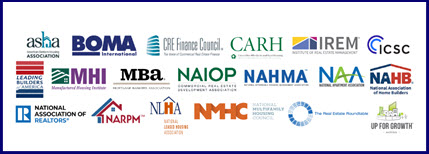 The House Ways and Means Committee may release a tax-focused economic growth package in June after a final resolution is reached between President Joe Biden, House Speaker Kevin McCarthy (R-CA), and their negotiation teams on the debt ceiling. The intense talks on federal spending limits have less than a week before the Treasury Department estimates the nation may default on its debt obligations. (Wall Street Journal, May 25 | PoliticoPro, May 23 | Roundtable Weekly, May 19)
The House Ways and Means Committee may release a tax-focused economic growth package in June after a final resolution is reached between President Joe Biden, House Speaker Kevin McCarthy (R-CA), and their negotiation teams on the debt ceiling. The intense talks on federal spending limits have less than a week before the Treasury Department estimates the nation may default on its debt obligations. (Wall Street Journal, May 25 | PoliticoPro, May 23 | Roundtable Weekly, May 19)
Tax Measures & CRE
Additional Provisions and TCJA Permanency

House Ways and Means Committee Chairman Jason Smith (R-MO) will be a guest at The Roundtable’s June 13-14 all-member Annual Meeting and policy adivisory committee meetings will include discussions on a debt ceiling agreement and potential tax legislation.
# # #

An updated study released this month by New York University and Columbia University researchers concludes “remote work is shaping up to massively disrupt the value of commercial office real estate in the short and medium term.” (Work From Home and the Office Real Estate Apocalypse, May 15)
Municipal Finances and Financial Stability
Moody’s Outlook

Roundtable Request for Flexibility

In addition to Mark Zandi and House Ways and Means Committee Chairman Jason Smith (R-MO), The Roundtable’s Annual Meeting next month will also include Sen. Kyrsten Sinema (I-AZ), Sen. Bill Hagerty (R-TN), and other policymakers.
# # #

The Real Estate Roundtable and 18 other real estate organizations urged Congress on May 23 to work with the Biden administration, housing providers, lenders, and other stakeholders to pursue bipartisan solutions to increase the nation’s supply of housing. (Coalition letter, May 23)
“Yes in My Backyard”
Tax Measures
On March 7, the National Multifamily Housing Council (NMHC) and National Apartment Association (NAA) offered joint testimony before a Senate Finance Committee hearing on “Tax Policy’s Role in Increasing Affordable Housing Supply for Working Families.” (Roundtable Weekly, March 10)
# # #